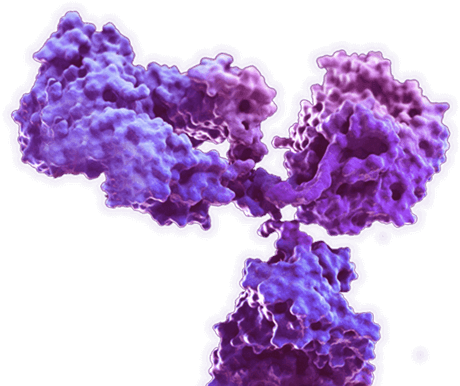AibGenesis™ Mouse Anti-ATG3 Antibody (CBMOAB-24516FYC)
Cat: CBMOAB-24516FYC

Certificate of Analysis Lookup
To download a Certificate of Analysis, please enter a lot number in the search box below. Note: Certificate of Analysis not available for kit components.
Lot Number
To download a Certificate of Analysis, please enter a lot number in the search box below. Note: Certificate of Analysis not available for kit components.
Lot Number
- Product List
- Specifications
- Application Information
- Target
- Reference
| Sub Cat | Clonality | Species Reactivity | Application | Clone | Conjugate | Size | |
| CBMOAB-24516FYC | Monoclonal | A. thaliana (Arabidopsis thaliana), C. elegans (Caenorhabditis elegans), Cat (Felis catus), Cattle (Bos taurus), Chicken (Gallus gallus), Chimpanzee (Pan troglodytes), Dog (Canis lupus familiaris), Elephant (Loxodonta africana), Fruit fly (Drosophila melanogaster), Guinea pig (Cavia porcellus), Horse (Equus caballus), Maize (Zea mays), Marmoset, Medaka (Oryzias latipes), Pig (Sus scrofa), Rabbit (Oryctolagus cuniculus), Sheep (Ovis aries), Yeast, Zebrafish (Danio rerio) | WB, ELISA | MO24516FC | 100 µg | ||
| CBMOAB-02004FYA | Monoclonal | Fruit fly (Drosophila melanogaster) | WB, ELISA | MO02004FYA | 100 µg | ||
| CBMOAB-66915FYA | Monoclonal | Zebrafish (Danio rerio) | WB, ELISA | MO66915FYA | 100 µg | ||
| CBMOAB-00385CR | Monoclonal | Yeast | WB, ELISA | MO00385CR | 100 µg | ||
| CBMOAB-00748HCB | Monoclonal | C. elegans (Caenorhabditis elegans) | WB, ELISA | MO00748HB | 100 µg | ||
| MO-AB-08930W | Monoclonal | Cat (Felis catus) | WB, ELISA | MO08930W | 100 µg | ||
| MO-AB-22212W | Monoclonal | Chimpanzee (Pan troglodytes) | WB, ELISA | MO22212W | 100 µg | ||
| MO-AB-29071W | Monoclonal | Dog (Canis lupus familiaris) | WB, ELISA | MO29071W | 100 µg | ||
| MO-AB-41275W | Monoclonal | Guinea pig (Cavia porcellus) | WB, ELISA | MO41275W | 100 µg | ||
| MO-AB-43754W | Monoclonal | Horse (Equus caballus) | WB, ELISA | MO43754W | 100 µg | ||
| MO-AB-47416W | Monoclonal | Maize (Zea mays) | WB, ELISA | MO47416W | 100 µg | ||
| MO-AB-51467W | Monoclonal | Marmoset | WB, ELISA | MO51467W | 100 µg | ||
| MO-AB-07750R | Monoclonal | Cattle (Bos taurus) | WB, ELISA | MO07750R | 100 µg | ||
| MO-AB-00099R | Monoclonal | Medaka (Oryzias latipes) | WB, ELISA | MO00099R | 100 µg | ||
| MO-AB-23912R | Monoclonal | Pig (Sus scrofa) | WB, ELISA | MO23912R | 100 µg | ||
| MO-AB-00120L | Monoclonal | Elephant (Loxodonta africana) | WB, ELISA | MO00120L | 100 µg | ||
| MO-AB-00206Y | Monoclonal | Chicken (Gallus gallus) | WB, ELISA | MO00206Y | 100 µg | ||
| MO-AB-07277Y | Monoclonal | Rabbit (Oryctolagus cuniculus) | WB, ELISA | MO07277Y | 100 µg | ||
| MO-AB-14279Y | Monoclonal | Sheep (Ovis aries) | WB, ELISA | MO14279Y | 100 µg | ||
| MO-DKB-0058RA | Polyclonal | A. thaliana (Arabidopsis thaliana) | WB | 50 µL |
Specifications
| Host species | Mouse (Mus musculus) |
| Species Reactivity | A. thaliana (Arabidopsis thaliana), C. elegans (Caenorhabditis elegans), Cat (Felis catus), Cattle (Bos taurus), Chicken (Gallus gallus), Chimpanzee (Pan troglodytes), Dog (Canis lupus familiaris), Elephant (Loxodonta africana), Fruit fly (Drosophila melanogaster), Guinea pig (Cavia porcellus), Horse (Equus caballus), Maize (Zea mays), Marmoset, Medaka (Oryzias latipes), Pig (Sus scrofa), Rabbit (Oryctolagus cuniculus), Sheep (Ovis aries), Yeast, Zebrafish (Danio rerio) |
| Clone | MO24516FC |
| Specificity | This antibody binds to Arabidopsis ATG3. |
| Format | Liquid or Lyophilized |
| Storage | Store at 4°C: short-term (1-2weeks) Store at -20°C: long-term and future use |
| Purity | > 90% was determined by SDS-PAGE |
| Purification | Purified with Protein A or G affinity chromatography |
| Cellular Localization | Other locations; Cytosol |
Application Information
| Application | WB, ELISA |
| Application Notes | ELISA: 1:1000-1:3000 Other applications are to be developed. The optimal dilution should be determined by the end user. |
Target
| Introduction | This gene encodes a ubiquitin-like-conjugating enzyme and is a component of ubiquitination-like systems involved in autophagy, the process of degradation, turnover and recycling of cytoplasmic constituents in eukaryotic cells. This protein is known to play a role in regulation of autophagy during cell death. A pseudogene of this gene is located on chromosome 20. Alternative splicing results in multiple transcript variants encoding different isoforms. (From NCBI) |
| Product Overview | Mouse Anti-Arabidopsis ATG3 Antibody is a mouse antibody against ATG3. It can be used for ATG3 detection in Western Blot, Enzyme-Linked Immunosorbent Assay. |
| Alternative Names | Autophagy Related 3; Autophagy-Related Protein 3; APG3-LIKE; APG3L; HApg3; APG3; ATG3 Autophagy Related 3 Homolog (S. Cerevisiae); Ubiquitin-Like-Conjugating Enzyme ATG3 |
| UniProt ID | Q0WWQ1 |
| Protein Refseq | The length of the protein is 313 amino acids long. The sequence is show below: MVLSQKLHEAFKGTVERITGPRTISAFKEKGVLSVSEFVLAGDNLVSKCPTWSWESGDASKRKPYLPSDKQFLITRNVPCLRRAASVAEDYEAAGGEVLVDDEDNDGWLATHGKPKDKGKEEDNLPSMDALDINEKNTIQSIPTYFGGEEDDDIPDMEEFDEADNVVENDPATLQSTYLVAHEPDDDNILRTRTYDLSITYDKYYQTPRVWLTGYDESRMLLQPELVMEDVSQDHARKTVTIEDHPHLPGKHASVHPCRHGAVMKKIIDVLMSRGVEPEVDKYLFLFLKFMASVIPTIEYDYTMDFDLGSSST. |
Reference
| Reference | 1. Wang, P., Sun, X., Wang, N., Jia, X., & Ma, F. (2017). Ectopic expression of an autophagy-associated MdATG7b gene from apple alters growth and tolerance to nutrient stress in Arabidopsis thaliana. Plant Cell, Tissue and Organ Culture (PCTOC), 128, 9-23. 2. Guan, B., & Xue, H. W. (2022). Arabidopsis AUTOPHAGY-RELATED3 (ATG3) facilitates the liquid-liquid phase separation of ATG8e to promote autophagy. Science Bulletin, 67(4), 350-354. |
See other products for " atg3 "
For Research Use Only | Not For Clinical Use.
Online Inquiry

